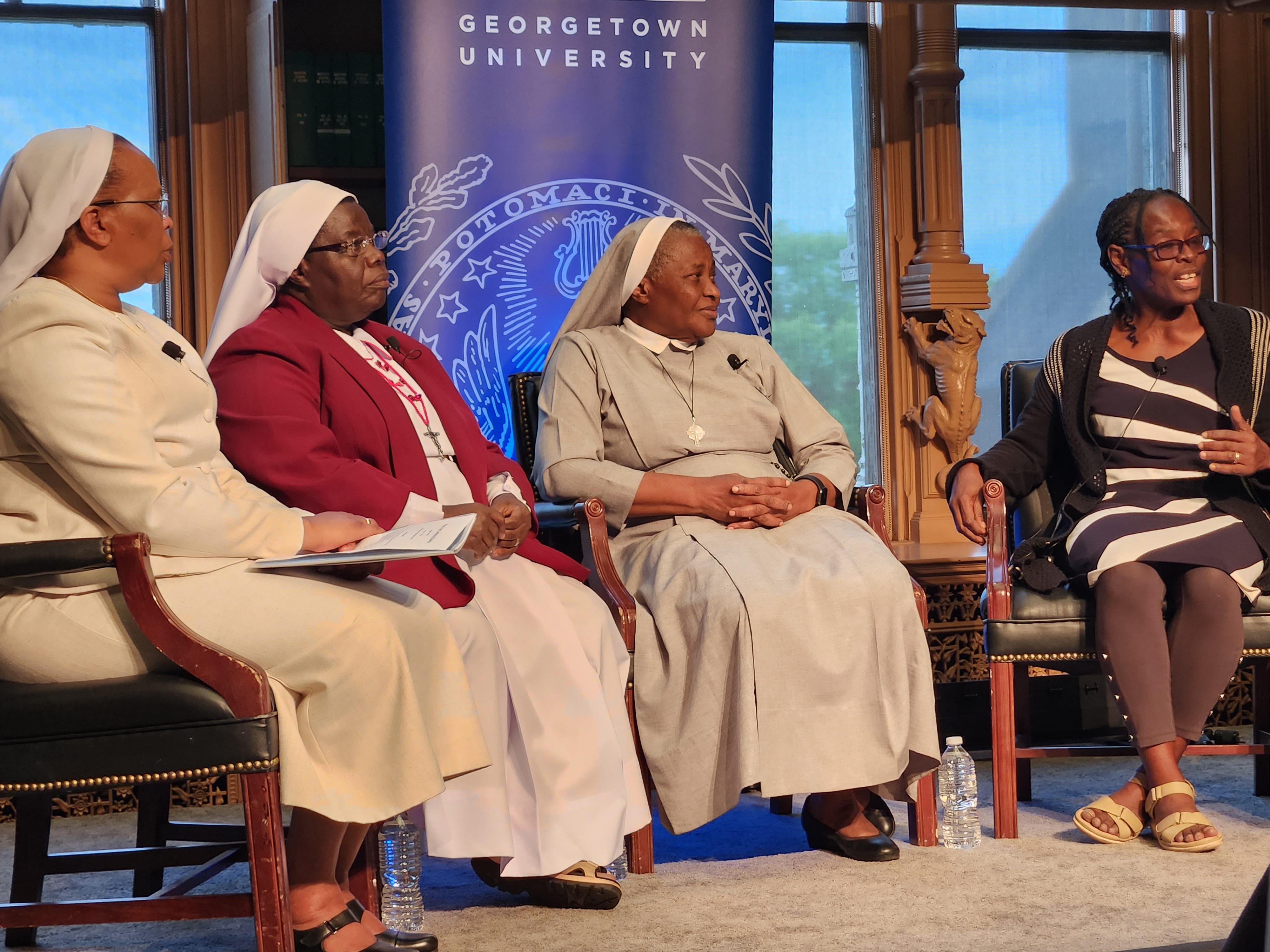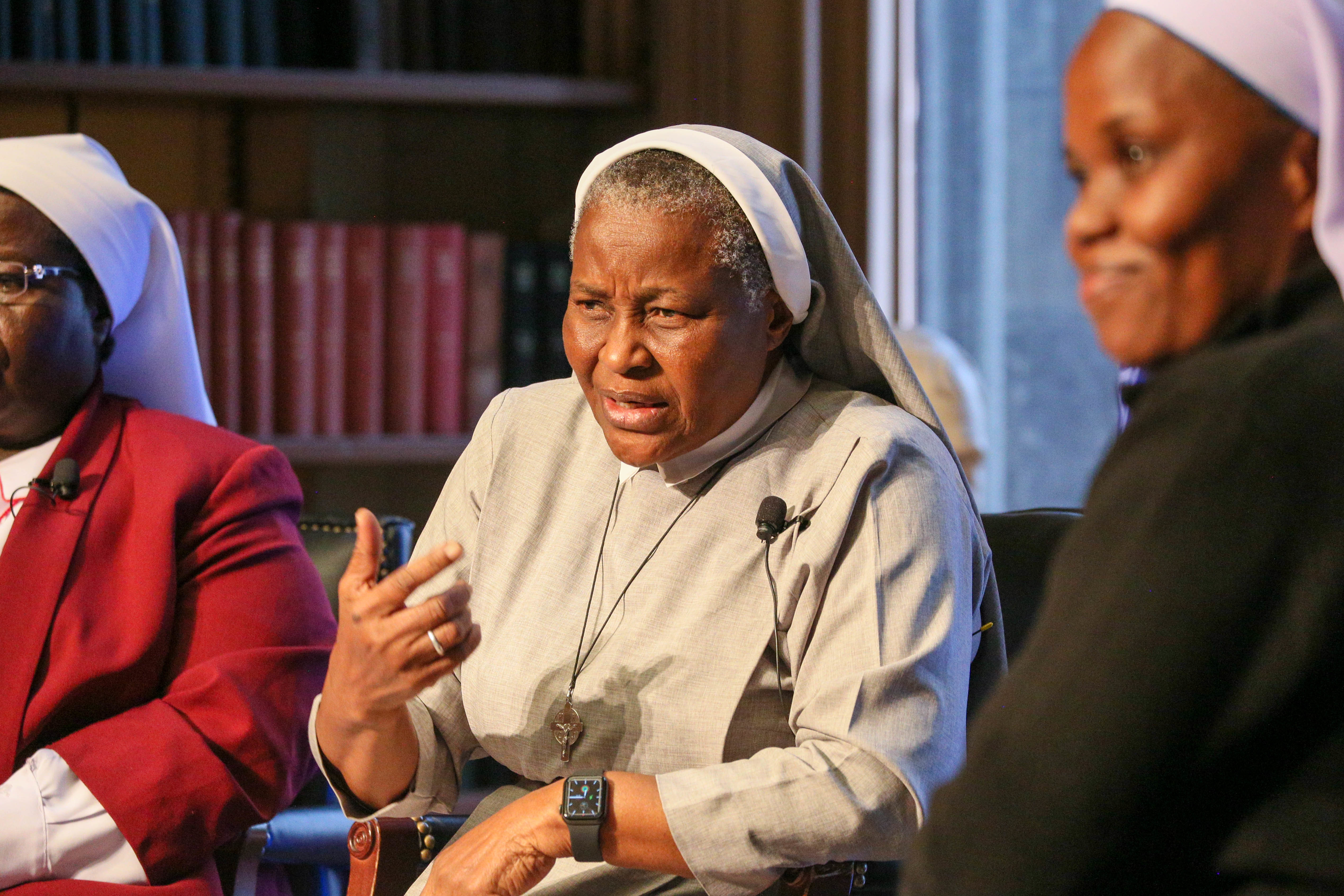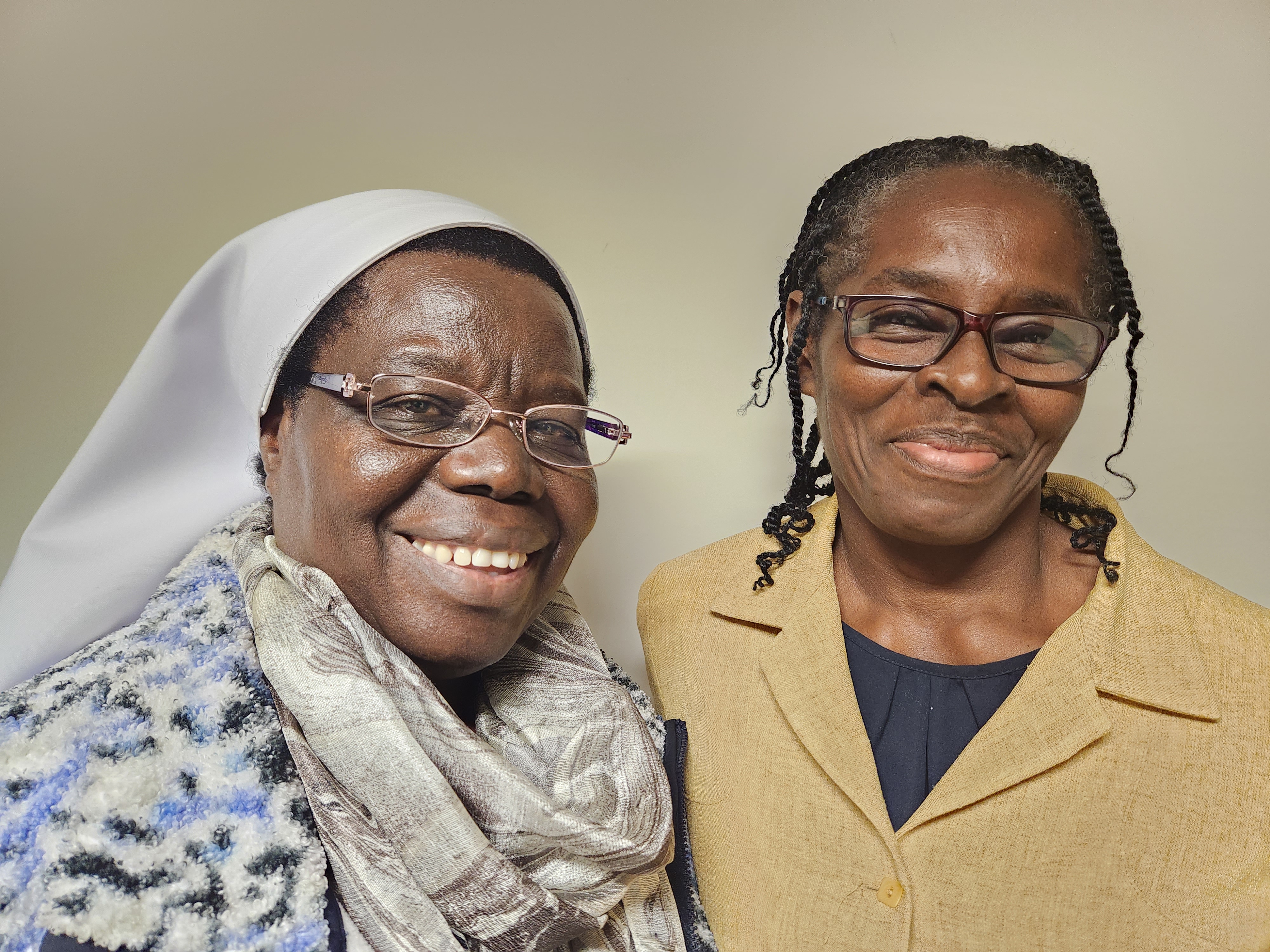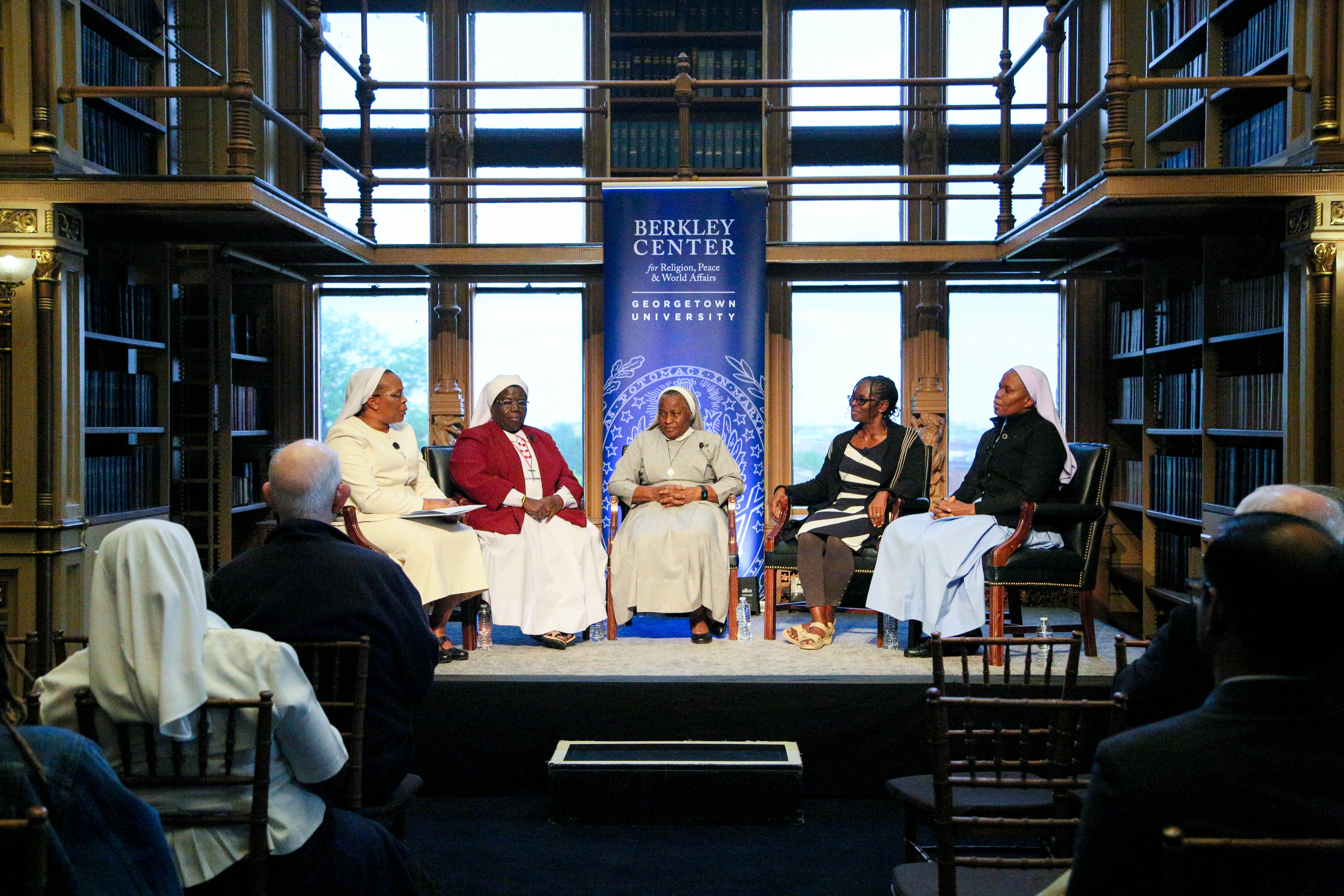
Sr. Josephine Apiagyei, far right, speaks at an April 25 forum at Georgetown University in Washington. The panel also included, from left: Sr. Jane Wakahiu, moderator; Sr. Rosemary Nyirumbe; and Sr. Francisca Ngozi Uti. Sr. Hedwig Muse was also on the panel but is not pictured. (GSR photo/Chris Herlinger)
When asked recently at a Georgetown University forum what keeps her going, Ugandan Sr. Rosemary Nyirumbe paused, then replied, "I get it from prayer and coffee."
To that, she can now add "fellowship from nine other sisters," participants in the first cohort of the Women in Faith Leadership Fellowship, a program with the aim of raising "the visibility, vitality, and voice of Catholic sisters" as they respond to the myriad challenges facing women religious leaders in African countries and the communities they serve.
The April 25 forum, held on the Washington, D.C., campus of the famed Jesuit university and sponsored by the Berkley Center for Religion, Peace, and World Affairs, came amid two weeks of lectures and seminars for the sisters from Ghana, Kenya, Nigeria, Tanzania and Uganda.
For Nyirumbe and the other sisters, "healing brokenness" and "sowing hope," as Nyirumbe described it, are essential for what they do, and the fellowship is meant to build on the sisters' demonstrated commitment to empowering girls and women in their communities.

Sr. Francisca Ngozi Uti of Nigeria, center, makes a point during an April 25 forum at Georgetown University. She is flanked by Ugandan Srs. Rosemary Nyirumbe, left, and Sr. Hedwig Muse. All are participants in the first cohort of the Women in Faith Leadership Fellowship, a jointly-sponsored program whose aim is to raise “the visibility, vitality and voice of Catholic sisters.” (Courtesy of Georgetown University)
It is also meant to expand visions. As the initiative focuses on such themes as religion and gender equality, it also emphasizes the role of religion and development and humanitarian work. During the fellowship, the sisters also met with Georgetown scholars of various disciplines, Washington-based policymakers, and officials from groups that included Catholic Relief Services, the United States Institute of Peace, the World Bank and the United States Agency for International Development.
The sisters also met with Sr. Simone Campbell, the former executive director of the Catholic social justice advocacy group Network.
The two weeks at Georgetown, which started April 15 and ended April 29, is only one part of the program. Later this year, the sisters will participate in the international Women Deliver Conference in Kigali, Rwanda, in July and return to the United States to attend events related to the annual United Nations General Assembly meetings in September.
At the end of the program, after the U.N. General Assembly, the 10 fellows will each undertake a capstone project with a focus on a personal or leadership goal that connects with immediate issues of ministerial concern, such as child marriage or pay equality for women.
The sisters will work with scholars they met at Georgetown, said panel moderator Sr. Jane Wakahiu, a Little Sister of St. Francis of Kenya, associate vice president of program operations and head of the Catholic Sisters Initiative at the Conrad N. Hilton Foundation, one of the funders of the fellowship program. (The Hilton Foundation is the primary funder of Global Sisters Report.)

Ugandan Sr. Rosemary Nyirumbe, left, and Sr. Josephine Apiagyei, a Ghana educator (GSR photo/Chris Herlinger)
The fellowship, Wakahiu told GSR in a followup email, is working to amplify the Catholic sisters' "visibility, vitality, and voice in responding to the complex challenges and opportunities sister leaders face within their organizations and communities as they silently work to provide essential services at the grassroots levels in their community."
In the African context, Wakahiu said, "sisters educate and rehabilitate girls rescued from war zones through psychosocial support, counseling, technical skills development, and entrepreneurship, connecting them to jobs. They also provide maternal and child health and uplift the rights of women and girls, particularly on socio-economic and human rights issues."
She added: "Not everyone understands what Catholic sisters do, yet, they are on the frontline of prayer and service to people in need." The Conrad N. Hilton Foundation is delighted to invest in the fellowship "to build the capacity of sisters to advocate for the issues they care about from the grassroots level and connect them to a broader audience through global platforms."
The April 25 Georgetown event, "Celebrating the Visibility, Vitality, and Voice of Catholic Sisters," provided an opportunity for four of the sisters to reflect on both their time in the fellowship and their ministries back home.
All four confirmed that the church has not done well in cultivating or appreciating the talents of women religious, which Thomas Banchoff, Georgetown's vice president for global engagement and director of the Berkley Center, noted in his introductory remarks.
Sisters are among "the most neglected" people within the church, and "the church itself has not given us enough room to grow," said Sr. Francisca Ngozi Uti, a member of the Handmaids of the Holy Child Jesus in Abuja, Nigeria.
Sisters would like more visibility in an institution they all revere despite its many shortfalls, Uti said.
"My truth is grounded in the Catholic Church," Uti added.

“Celebrating the Visibility, Vitality and Voice of Catholic Sisters” featured four of 10 sisters who are the first cohort of the Women in Faith Leadership Fellowship. On the left is Sr. Jane Wakahiu, associate vice president, program operations and head of the Catholic Sisters initiative at the Conrad N. Hilton Foundation, one of the funders of the fellowship program. The four participating sisters are, from left to right, Srs. Rosemary Nyirumbe, Francisca Ngozi Uti, Josephine Apiagyei and Hedwig Muse. (Courtesy of Georgetown University)
Sr. Hedwig Muse of the Little Sisters of Mary Immaculate of Gulu, Uganda, agreed.
"Faith is the greatest pull for us," said Muse, a legal and program officer for human rights in the Justice and Peace Commission of the Association of Sisterhoods of Kenya in Nairobi.
All the sisters in the fellowship program believe that "the name of God permeates everything we do," said Sr. Josephine Apiagyei, a Ghana educator and a member of the Sisters of St. Louis in Kumasi.
All four sisters said their ministries unfold in the context of patriarchal church institutions and in heavily male-dominated societies "where half the population is marginalized, even in the church," Uti said.
"We try to dismantle the unjust systems that demonize the girl-child" in hopes of creating "a better Africa," she said.
Education is a basic human right for girls, "empowering them … and giving them dignity," said Nyirumbe, a member of the Sisters of the Sacred Heart of Jesus in Gulu, Uganda, and director of St. Monica's Girls Tailoring School, a program for female survivors of violence from an ongoing civil war. The center seeks to restore dignity through advocacy, education, vocational training and psychological services.
In an interview with Global Sisters Report the day after the Georgetown event, Apiagyei and Nyirumbe praised the fellowship for deepening and expanding their worldviews and for making connections the sisters can build on.
"I realize how myopic I've been, focused only on my own ministry," Apiagyei said, adding that others in the program have taught her the need to learn more deeply about students' lives and the greater social context in which they live.
Nyirumbe said the fellowship has allowed her to step back a bit, question attitudes and discover that her fellow sisters from other countries, cultures and contexts are conscious that their role in the church is rarely visible.
"Where I come from, you work and you work until you're consumed," she said.
Advertisement
Institutional church culture often makes ministry challenging, Apiagyei and Nyirumbe said. Both were quick to add, however, that sisters do have some allies among male clergy — maybe not many, but some — and that those relationships are worth cultivating.
"You have to build those relationships one-on-one," Nyirumbe said.
Apiagyei added: "There are always allies. There's always someone who will have your back."
Neither sister believes the call for women's ordination is as urgent in African countries as it is in the Global North, but greater equality within the church is needed.
"We do a lot without being ordained," Nyirumbe said.
As for the time in Georgetown, "I have the Holy Spirit, and now, I have a Jesuit education," Nyirumbe said, laughing.
The Hilton Foundation helped plan and envision the fellowship program in partnership with the Bill & Melinda Gates Foundation; Joint Learning Initiative on Faith and Local Communities; the Berkley Center for Religion, Peace, and World Affairs at Georgetown University; and the Center for Public and Nonprofit Leadership at Georgetown University. The Hilton Foundation and the Bill & Melinda Gates Foundation also provided funding for the program.





